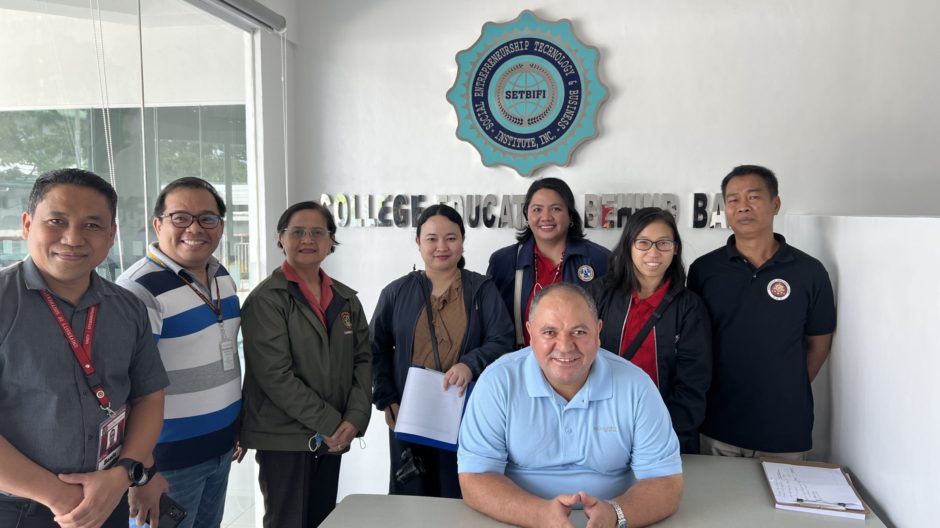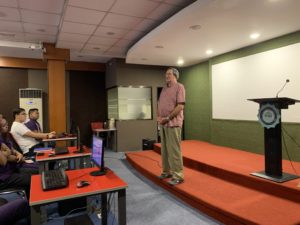
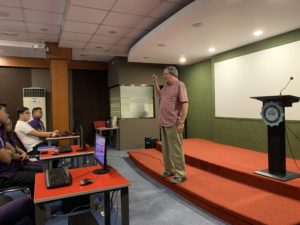
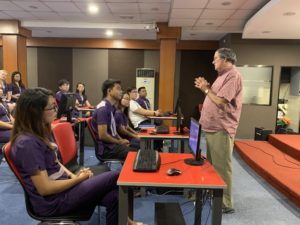
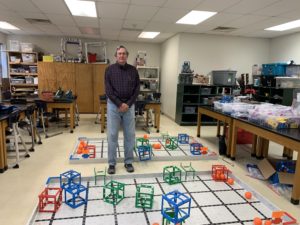
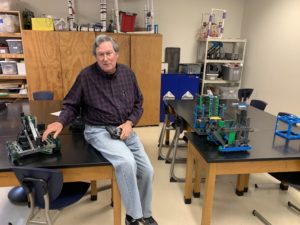
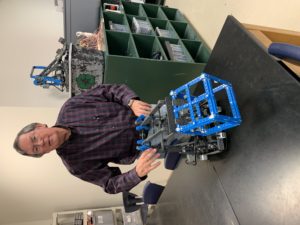 Educators on all levels — teachers, principals, and superintendents — know the value of learning science, technology, engineering, and math (STEM) and of focusing on technology in education. Boles Independent School District (ISD) in Texas, USA has now had several successful years of robotics instruction in the middle school and high school. A majority of Boles IDS students have learned to program and to construct robots with the Lego and VEX EDR hardware. Partnering with Thompson Christian School (TCS), the Social Entrepreneurship Technology and Business Institute (SETBI) invited an engineer, Johnny Tharp, to hold a workshop at TCS on March 9th, 10th, 11th and 12th. 2020. Tharp assists in the robotics program at the Boles ISD. This year he mentored students who finished second in their state tournament and who qualified for the Create U.S. Open Championship and the VEX IQ World Championship. The workshop covered:
Educators on all levels — teachers, principals, and superintendents — know the value of learning science, technology, engineering, and math (STEM) and of focusing on technology in education. Boles Independent School District (ISD) in Texas, USA has now had several successful years of robotics instruction in the middle school and high school. A majority of Boles IDS students have learned to program and to construct robots with the Lego and VEX EDR hardware. Partnering with Thompson Christian School (TCS), the Social Entrepreneurship Technology and Business Institute (SETBI) invited an engineer, Johnny Tharp, to hold a workshop at TCS on March 9th, 10th, 11th and 12th. 2020. Tharp assists in the robotics program at the Boles ISD. This year he mentored students who finished second in their state tournament and who qualified for the Create U.S. Open Championship and the VEX IQ World Championship. The workshop covered:
- Facilitation of VEX curriculum
- Basic construction techniques with VEX parts
- Methods of storage, instruction, and robotics classroom management
- Competitive strategies on how to build a robotics program
- Competitive strategies how to join VEX world championship
- Programming in both Vex coding and Vex Code
- Basic Autonomous Control
Participants learned how to program and to construct with two types of hardware. The workshop demonstrated the use of VEX IQ for competitive robotics. According to Engineer Johnny Tharp, “Robotics takes education technology to a new level, creating the next evolution in teaching. That’s because introducing robotics to schools means making STEM skills and knowledge hands-on and fun, to prepare students for the future in a way that feels more like creativity and less like homework. Robotics requires all of the subjects of STEM, so it’s a well-rounded approach to educational technology and learning.”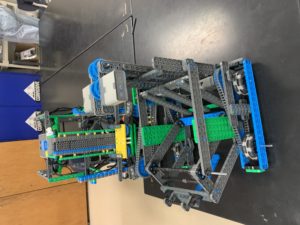
Education is a collaborative field, and school administration should always be open to sharing ideas. These days society, technology, and our entire culture seem to advance in leaps and bounds. At TCS, educators prepare for the future. Many of those educators go above and beyond to prepare students for whatever is coming next, and that is the case at SETBI and at TCS in Davao City with a total student body population of approximately 500-600. For the last couple of years, TCS has been a successful gateway to social and economic mobility to many Persons Deprived of Liberty (PDL) students at the College Education Behind Bars‘ senior high school level. President of TCSl, Attorney Susan Cariaga, believes education is a shared responsibility and takes a stand on education by helping, sponsoring, and serving students especially the least, the lost, and the last one; her attention is a gift to needy students. TCS not only helps students inside the jail with their academics but also invests in their future to make our streets safe. SETBI seeks to recognize social problems in order to achieve social change by using the entrepreneurial principles, process, and operations to solve these problem. It seeks to study and discover social problems, to identify the solutions that are not working, and then to create and organize alternatives, initiating collaboration with stake holders and managing a social venture to attain the desired change.
In the school setting, robotics encourages problem-solving, creative thinking, and a healthy sense of competition that drives students to innovate. Reading about technology or robotics in a book is perhaps the traditional way to learn, but putting that theory into practice by building or controlling a robot involves hands-on learning that is retained for the future. It also takes teamwork to make a robotics project run smoothly, and that is a skill everyone needs. That does not mean that robotics is an easy part of STEM. In fact, this education technology can be a challenge for some learners—but a good challenge. As students improve with robotics and programming, they learn determination, perseverance, and the way to plan and process with technology. These are all skills that will further their continuing education and their future career prospects.
This year TCS will begin offering VEX robotic classes at the middle school level and high school level. The students will attend a 45 minute robotics class every day. The VEX program from Boles, entrusted to SETBI, teaches students a number of hard and soft skills that will benefit them as they enter high school or college and eventually the workplace. As hard skills go, students learn how to construct a robot. They also learn how to write a program to teach robots to play games. For the autonomous portion of the VEX program, the students can also create a list of instructions for the robots to perform certain maneuvers. On the soft skills side, the benefits of VEX robotics participation are several. Students have to learn to work with their teammates and partnering teams in a positive, collaborative way. The program helps develop student’s writing skills, as they are required to maintain an engineering notebook throughout the design, construction, and programming, explaining the steps they have taken. SETBI has dreamed of running such an outstanding robotics team and class. As another benefit, robotics is a widespread education technology that could lead to more community and educational opportunities. From robotics competitions to showcases for friends and family, robotics drives community involvement, giving students something for which they can be proud. Robotics is a fun way to bring STEM to life, and that is important because STEM is the key to a successful future for students with an interest and motivation to pursue careers in this field.
We are hoping the Boles ISD’s VEX team will pair up with the SETBI’s team, and after collaboration is approved, SETBI’s students can attend a robotics camp with the Boles ISD. Students from Boles ISD could travel to Davao to work with the SETBI teammates on creating a robot to bring to the VEX competition sometime in the future. In the meantime, through Skype Mr. Tharp will mentor as SETBI/TCS creates its own robotics program and team. If all goes well with our goals, SETBI hopes to participate in the VEX World Championship. This kind of teamwork will generate opportunities for growth and connection for the SETBI/TCS and Boles ISD. If you interested to enroll your kids to VEX robotic program. Feel free to contact me . aland_mizell2@hotmail.com
About the Facilitator
Johnny Tharp was born in Greenville, Texas in 1951, and graduated from Greenville High School in 1969. He attended Texas A&M University, where he received a Bachelor of Science in Engineering Technology with a specialty in Computer Science. After graduation he went to work at E-Systems in Greenville, where he worked in the Business Computer Systems area. After getting his Master of Science in Computer Science from Texas A&M University-Commerce, he was promoted to the Systems Department. There he wrote part of their Teleprocessing System, a precursor to today’s internet. After being self-employed for twenty-three years, he became a math teacher. He was recruited by Greenville High School for its robotics program to become an assistant coach. He was an assistant coach when the Robowranglers were world champions in 2008. He has been a coach in VEX Robotics from the very first year they held tournaments. His youngest son drove the very first VEX robot built in Greenville High School. That year, 1995, he coached the team to the national championship. He has continued to be involved in VEX Robotics. He started the VEX Robotics Program iin Greenville Texas. This program grew to having VEX Robots being built in all campuses with a total of approximately 100 robots being built. In 2015, Greenville was once again the national champion. Upon retiring from Greenville in 2018, he has helped with the robotics program at Boles ISD Texas. This year the team he mentored finished second in their state tournament and has qualified for the Create U. S. Open Championship and the VEX IQ World Championship.
